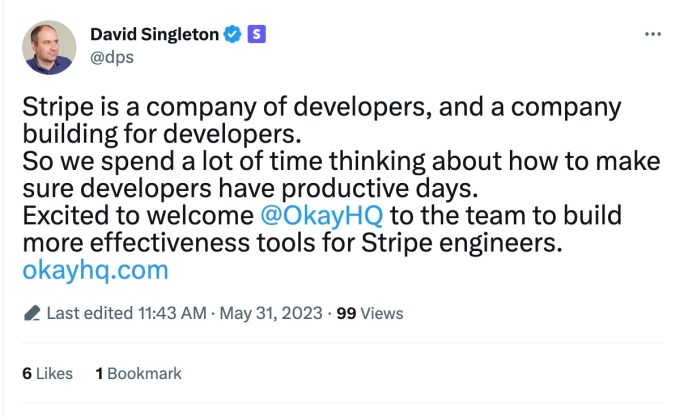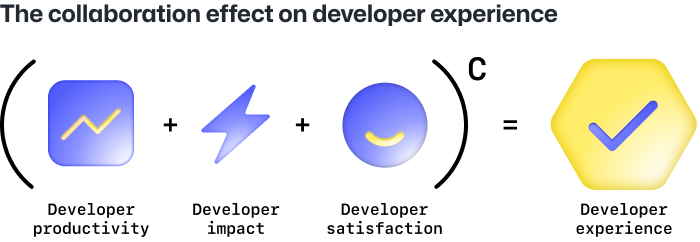Inside the Developer's World: Why a Positive DevEx is the Path to a Company's Success
Explore DevEx's impact, challenges & AI's role in shaping software dev's future. Uncover its power as a competitive advantage, unlocking dev teams' true potential for remarkable outcomes. Join us on this journey to software success.

In today's rapidly evolving and competitive software development landscape, one factor has emerged as a true game-changer: Developer Experience (DX or DevEx). The way developers interact with technologies and resources can profoundly impact their productivity, satisfaction, and the overall success of software projects.
As a coder, I intricately spoke the language of software, wielding functions and algorithms to build the nuts and bolts of digital tools. My perspective expanded when I transitioned to product management to build dev tools and services. In this blog, we will explore the crucial role of developer experience in the software development industry and why it has become a key focus for companies seeking a competitive advantage.
Defining Developer Experience (DevEx)
To simplify things, let me start by defining a common software discipline - UX. What is User Experience (UX)? UX is a user's overall experience when interacting with a product. Now, let's substitute "Developer" for "User." Therefore, Developer Experience (DevEx) is a developer's overall experience when interacting with a product.
Expanding the definition: DevEx encompasses all aspects of the developer's interaction with the tools, frameworks, services, and environment when building, testing, and maintaining software. It focuses on providing developers with the resources to efficiently and effectively create high-quality software. The ultimate goal of DevEx is to enable developers to be more productive while delivering better software solutions.
DevEx can be a competence of a company as well as its business. Let's take the example of Stripe. Stripe focuses on the developer's productivity by building or investing in the right tools. At the same time, the company offers extensive documentation, libraries, and resources that make it relatively easy for "external" developers to implement payment processing functionality. Thus, a developer is both an employee and a customer of Stripe.
DevEx is often overlooked in the industry as a company's competency in providing an exceptional experience for its developers (the employees). Today, our focus will be on that competency.
The Importance of DevEx
In the realm of software development, DevEx has gained significant traction, and for good reasons. DevEx goes beyond the technical aspects, focusing on the human experience and the quality of interactions throughout the development process. But why does developer experience matter? DevEx matters because a positive developer experience can:
- Boosting Productivity and Efficiency: A positive DevEx significantly reduces time-to-market for features and products, enabling developers to be more productive.
- Improving Software Quality: A good DevEx influences the overall software quality, leading to better software solutions.
- Retaining Top Talent and Fostering a Positive Work Environment: A satisfying developer experience contributes to employee satisfaction and retention.
- Streamlining Onboarding of New Team Members: A well-structured DevEx helps new team members quickly adapt and contribute effectively.
- Fostering Collaboration: A positive DevEx encourages effective collaboration among developers and teams.
Thus, a good DevEx helps an organization build a competitive advantage. Let's study an example. This year, Fintech giant Stripe acquired Okay. This startup developed low-code analytics software to help engineering leaders understand how their teams perform. As the company prepares for its long-rumored IPO, Stripe is taking steps to maximize the productivity of its teams with an acquisition like this.

However, often, companies build their infrastructure tools instead. PayPal is a good example. Thus, it is rare to see a company acquire an internal tooling company this way. Okay used to be a SaaS product. Leading Fintech companies like Plaid, Brex, and others like Instacart used the tool to improve productivity. Post-acquisition, though, Stripe is keeping this tool all for itself.
Differentiating Developer Experience from Developer Productivity
Developer experience and developer productivity are not synonymous. GitHub has a fancy formula to measure DevEx.

However, many organizations often make the mistake of conflating the two. As a result, they get into the rabbit hole of measuring productivity.
Measuring productivity is no joke. At first glance, calculating a developer's productivity might seem like no rocket science. You divide the outputs of the developer by the inputs used to produce that output. What are these outputs? Are they lines of code, number of bugs, number of commits, number of tests, or frequency of release? Do you see how murky it can be? If it is the number of lines of code, then Bill Gates once said,
"Measuring programming progress by lines of code is like measuring aircraft building progress by weight."
If the rumors are to be believed, Elon Musk famously fired engineers based on how many lines of code they wrote.
Measuring DevEx: Challenges and Metrics
Currently, there are no standardized industry metrics for measuring DevEx. However, frameworks like the DevOps Research and Assessment (DORA) can offer valuable insights. Key metrics include:
- Deployment frequency (DF): how frequently an organization releases new software
- Lead time for changes (LT): the time taken from when a change is requested or initiated to when it is deployed
- Mean time to recovery (MTTR): the average time it takes to recover from a failure
- Change failure rate (CFR): the percentage of changes that result in a failure
The Future: The Role of AI in DevEx
Generative AI holds great promise in revolutionizing DevEx. A McKinsey study shows that software developers can complete coding tasks up to twice as fast with generative AI. The substantial value developers get from tools like GitHub Copilot makes companies like Stack Overflow sweat.
However, if one speeds things up at the beginning of the software delivery value chain, will it have a rippling effect on the whole chain? That's a question yet to be answered. But as AI technology advances, its integration into DevEx will likely become more prevalent across the whole value chain, further enhancing productivity and efficiency.
In Conclusion
DevEx is critical in swiftly delivering value to customers and gaining a competitive edge. As a discipline, it continues to grow in importance across enterprises (e.g., PayPal) and is poised to influence mid-market (e.g., HelloFresh) and small-sized companies shortly. By prioritizing and optimizing developer experience, companies can position themselves for success in the ever-changing software development landscape.
